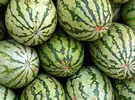 More volumes of Moroccan watermelons this season? less? statements contradict each other and uncertainty still reigns after the first harvests. However, according to several professional sources, it is not a question of uncertainty about volumes, but rather of concern and doubt about the future of the sector.
More volumes of Moroccan watermelons this season? less? statements contradict each other and uncertainty still reigns after the first harvests. However, according to several professional sources, it is not a question of uncertainty about volumes, but rather of concern and doubt about the future of the sector.
In a context of acute water stress, and a year of drought unprecedented in 4 decades, the watermelon sector is being singled out and blamed by public opinion, prompting the government to limit watermelon production in some parts of the country, or even ban it completely in others.
While the watermelon export campaign in Morocco has already begun, asking the question of volumes seems embarrassing for most producers, especially in the Zagora region. Admitting that there are more volumes or the same as last year, means that government restrictions have been useless or even insufficiently enforced.
One exporter located in the Souss Massa region said, "Only Zagora's crop is available in the market at the moment. With Zagora being the main region under restrictions, it is reasonable to assume that there is a shortage of volume. The local government has reduced the cultivable area to 1.5 ha per producer. However, the market situation is quite different, with abundant volumes and insufficient demand. This is due to a multiplication of growers in response to the restriction of the area per grower."
Another grower from northern region of Larache said, "It is expected that volumes will become huge very soon when other regions will have finished their harvest. This is particularly the case of the regions of Loukous and Gherb which have experienced a peak in production this year." He continues, "in addition to the usual watermelon producers, countless newcomers to the industry have converted large areas into watermelon production, and even new investors who are entering the agribusiness for the first time, encouraged by the success of the watermelon industry last season."
Another watermelon grower from Souss Massa region said, "the end of the watermelon season is likely to be difficult for growers and exporters, with excessive volumes and falling prices. But we remain optimistic and expect demand to improve as soon as temperatures rise in Europe, especially in the context of lower Spanish volumes. One sign is that European buyers have rejected Mauritanian watermelons that arrived on the market too early and have preferred to wait for the start of the Moroccan watermelon season."
